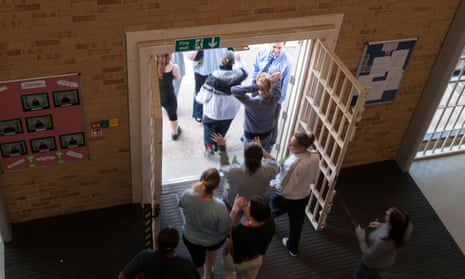Women who have been unfairly convicted or sentenced to jail are being denied the chance to redress miscarriages of justice because the appeals system in England and Wales is not fit for purpose, the law group Appeal has alleged.
In particular, those who have been victims of trauma or domestic abuse are unable to make a legal challenge due to the “unrealistic” 28-day window allowed to make an application to the criminal Court of Appeal, the report highlights.
Its author, Naima Sakande, Appeal’s women’s justice advocate, said innocent women who had experienced trauma were left to languish in prison because the time limit had expired by the time they were able to disclose the abuse.
Women make up 5% of the prison population and three quarters of those sentenced to custody receive less than 12 months in jail. “Six months in prison is enough time to lose your job, your house and custody of your children but is not enough time for rehabilitative work,” said Sakande. “So it’s really important that we can challenge those short, life-changing sentences.”
She analysed letters seeking advice from 132 women in custody as well as surveys of 33 women in prison and 20 barristers and solicitors who had experience of appeals.
One woman wrote: “I suffered domestic abuse from my partner and was told nobody, not even the judge, believed me.”
Another said: “The first judge ordered a psychological report prior to sentencing and that this should be reviewed by probation … The probation report advised against a custodial sentence.”
Many found it difficult to disclose abuse until well after sentencing, so the details were absent from their defence. Those who had suffered trauma tended to prioritise their mental illness and only revealed their full circumstances at a later date.
Of those who wrote to Appeal, 86% were already outside the 28-day limit. Of those seeking advice about an appeal, 45% claimed to be innocent. One wrote: “I fully appreciate that saying I’m innocent isn’t a valid reason grounds-wise. But innocent I am.”
Nicola Padfield, professor of criminal and penal justice at the University of Cambridge said: “What this research shows with heart-breaking clarity is the impossibility for so many women of processing an application for appeal in the first weeks of a custodial sentence. [The findings] make a clear case for changing the tight time limits imposed by current law.”
Black women, in particular, are significantly disadvantaged in the criminal justice system, the report found. Sakande said: “Following a conviction, black women are 29% more likely than white women to be remanded in custody and 25% more likely to receive a custodial sentence.”
As they are over-represented in the women’s prison population, you would expect more black women to seek redress, said Sakande, yet black and other minority ethnic women are less likely to complain. “There is a real fear that the system won’t take them seriously and will protect those in power over their own rights,” she said.
Between 2011 and 2019, appeals to the Court of Appeal dropped by 36%. While the number of prosecutions and convictions also fell during this period – by 15% and 12% respectively – the figures do not account for a drop in cases of more than a third .
“There is a real concern about caseload at the Court of Appeal so that drop has been deliberate in order to reduce the number of cases judges are hearing”, Sakande claimed.
Cuts to legal aid have not helped and the report found a sense of futility among lawyers who take on appeals.
Harriet Wistrich, a human rights lawyer and founder of the Centre for Women’s Justice, said: “The majority of crimes, particularly violent crimes, are committed by men. However, women are disproportionately prosecuted and convicted.”
She said victims of domestic violence are frequently criminalised when they take desperate measures to survive.
Wistrich said: “In my experience of representing women convicted of murder when they killed a man who was violent, there are usually miscarriages of justice – but the avenues for appealing are extremely limited. If their [lawyer] did not provide a proper context for the killing, leading a jury to a manslaughter verdict, there may be no grounds for appeal even though on the facts of the case it appears to be a grave injustice.”
The report recommends replacing the 28-day window with a six-month deadline and setting up regional courts to increase the volume of appeals that could be heard.
A Ministry of Justice spokesperson said: “While the right of appeal is a central pillar of our justice system, it is only right that victims and witnesses have certainty when a case closes, which is why the appeal window is time limited. Judges can extend this in individual cases. We spend £1.7bn on legal aid but are reviewing the way it is administered in criminal cases, to make sure people can access the support they need at the earliest opportunity.”
